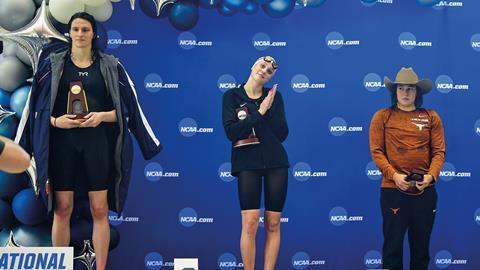The controversial topic of transgender participation in women’s sport was discussed at the recent LawAccord conference. Speakers were – perhaps unsurprisingly – deeply divided on next steps
Is there a more bitterly divisive issue right now involving the ethics and integrity of sport than the debate over transgender athletes? Culture secretary Lucy Frazer KC MP this month called on sporting bodies to ‘take an unambiguous position’ and ban male-born transgender athletes from competing in elite women’s sport.
Next month the Court of Arbitration for Sport is expected to rule on a challenge by US transgender swimmer Lia Thomas to World Aquatics’ eligibility policy. The swimming governing body voted in 2022 to restrict transgender athletes from taking part in elite women’s competitions, but Thomas’ legal team argues that elements of the regulations (known as challenged provisions) should be redrawn.
At the LawAccord conference in Birmingham earlier this month, World Aquatics chief executive Brent Nowicki said the current framework is based on the data that exists today about transgender athletes’ performance compared with athletes born female.
‘I work in a world of “evidence enough” as I have 210 [national] members who need some guidance on this,’ he said. ‘We are not forcing anybody to do anything. We are just looking at a problem that we are trying to find a policy to resolve the best we can… We are not trying to find an exact answer today. It is evolving but we are working on the knowns as we know them.’
But at the same event, Professor Yannis Pitsiladis, a member of the International Olympic Committee Medical and Scientific Commission, said that sporting federations had taken a tougher stance on transgender inclusion in recent years without reliable evidence. He said fairness had been ‘moved aside’, and asked how federations and sporting organisations could maintain the position of pushing non-discrimination messages while appearing to discriminate against transgender athletes.
Pitsiladis acknowledged that establishing policy for the inclusion of transgender athletes was ‘immensely challenging’ but called for ‘nuanced assessments amidst our evolving scientific understanding’. Pitsiladis cited research finding that transgender athletes were at a physical disadvantage compared with women because of the effects of transitioning from male to female. Transgender women had performed worse in certain cardiovascular tests and had less lower-body strength than athletes who had been born female, Pitsiladis said.
'There is no right to compete in elite sport. There is only a right to compete if you comply with the rules in place'
Jonathan Taylor KC, Bird & Bird
Speakers at the event suggested that there is a danger that intractable sporting organisations will seem backward in years to come as these issues evolve.
Dr Seema Patel, associate professor in law at Nottingham Law School, said: ‘We are in a position where the world is evolving and our understanding of gender identity is developing. In many areas of society, the spectrum has evolved and developed. Sport maintains those divisions for many justifiable reasons but that is where the conflict arises.’
However Jonathan Taylor KC, head of the sports division at international firm Bird & Bird, said supporters of transgender inclusion miss the point when they argue that transgender women would not all outperform ‘cis women’ if allowed to compete.
Regarding the idea of ‘tolerable unfairness’ – where it is considered fair as long as transgender athletes’ times are within those of cis athletes, he said: ‘I don’t think I have heard anything more stupid in my life. As long as you don’t beat the women’s world record it should be allowed even if you have displaced other female athletes? What if you displace the 10th athlete so she doesn’t get into the final or the 100th so she doesn’t qualify?’
He added: ‘There is no right to compete in elite sport. There is only a right to compete if you comply with the rules in place.’
The Court of Arbitration for Sport will attempt to find a solution to such emotive issues, but there is no guarantee it will end there.
Caster Semenya, a South African runner, lost her challenge to World Athletics’ regulations on sex eligibility criteria and testosterone levels at CAS and then successfully appealed to the European Court of Human Rights. Critics of CAS suggest that it cannot deal with human rights law, but Nowicki is backing the process.
‘It is an entirely fit-for-purpose entity built for these issues – you can debate whether they should have more science-based arbitrators but this is about more than that,’ he said. ‘It is the right place to get these matters resolved.’




































